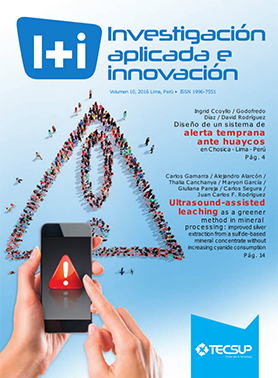Adsorption Refrigeration for Food Transportation and Preservation
DOI:
https://doi.org/10.71701/9m8v5f78Keywords:
Refrigerated trucks, food conservation, solar energy, adsorption refrigeration, food transportationAbstract
Inadequate food distribution system originates losses and wastes. So, in Perú, the fleet trucks transporting food usually do not have incorporated cooling systems. In this context a proposal for an ecoinnovative hybrid system with solar energy cooling and exhaust gas refrigeration for transporter food trucks has been developed. The methodology consisted of a review of literature and patents on cooling systems by adsorption, the estimation of the cooling load for truck, the selection of a cooling system by adsorption and its heat requirements, and the definition of energy supply, hybridizing solar energy with exhaust gases as energy sources. The integration of these two energy source modules, according to Wu et al (2011) and Luo et al (2007) was completed during the conceptual design phase. The main results of this study was a conceptual thermodynamic design integrating two complementary and synergistic sources of energy, the same that should be contrasted with a cooling prototype to be built.
Downloads
References
Ashrae. (2014) Ashrae Handbook of Refrigeration. Amer Society of Heating
Domínguez, M., García, C., & Arias, J.M. (2009). Recomendaciones para la conservación y transporte de alimentos perecederos. (S.l.).: Instituto del Frío. Recuperado de http://digital.csic.es/bitstream/10261/15514/1/RECOMENDACIONES%20PARA%20LA%20CONSERVACI%C3%93N%20Y%20TRANSPORTE%20DE%20ALIMENTOS%20PERECEDEROS.pdf
Foro Frio. (2016). Sistemas de Refrigeración en Camiones. Recuperado de http://www.forofrio.com/index.php?option=com_content&view=article&id=293:sistemas-de-refrigeracion-encamiones&catid=9:actualidad&Itemid=54
Luo, H.L., Wang, R.Z., Dai, Y.J., Wu, J.Y., Shen, J.M., & Zhang, B.B. (2007). An efficient solar - powered adsorption chiller and its application in low-temperature grain storage. Solar Energy, 81, 607 -613. Recuperado de http://waterandfire.ir/Down_En/12_WaterandFire.ir_.pdf
Ramos, M., Espinoza, R., Horn, M., & Ferreira, A. (2003). Evaluation of a zeolite - water solar adsorption refrigerator. ISES Solar World Congress. Göteborg, Suecia. Recuperado de http://fc.uni.edu.pe/mhorn/ISES2003%20(solar%20refrigeration).pdf
Vera, S., Sartarelli, A., Echarri, R., Cyrulies, E., & Samson, I. (2011). Prototipos de refrigeradores solares por adsorción. Avances en Energías Renovables y Medio Ambiente, 15, (03.41 – 03.50).
Verde, M., Cortes, L., Corberán, J.M., Sapienza, A., Vasta, S., & Restuccia, G. (2010). Modelling of an absorption system driven by engine waste heat for truck cabin A/C. Performance estimation for a standard driving cycle. Applied Thermal Engineering, 30 (13), 1511– 1522
White, J. (2011). Literature review on adsorption cooling technology. Recuperado de http://academic.uprm.edu/laccei/files/journals/1/articles/378/submission/review/378-884-1-RV.pdf
Wu, W., Zhang, H., & Men, C. (2011). Performance of a modified zeolite 13X-water adsorptive cooling module powered by exhaust waste heat. International Journal of Thermal Sciences, 50 (10), 2042-2049.
. (2016). Patente CN201665180 U. China. Recuperado de https://www.google.com.pe/patents/
Downloads
Published
Issue
Section
License

This work is licensed under a Creative Commons Attribution-NonCommercial 4.0 International License.


